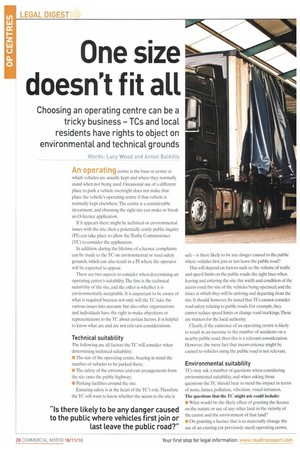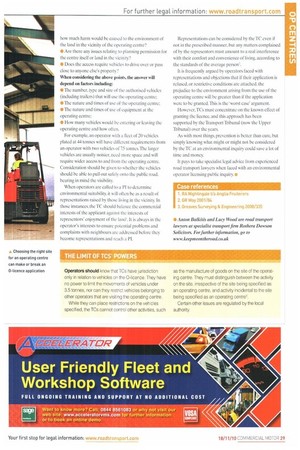One size doesn't fit all
Page 28

Page 29

If you've noticed an error in this article please click here to report it so we can fix it.
Choosing an operating centre can be a tricky business TCs and Local residents have rights to object on environmental and technical grounds
Words; Lucy Wood and Anton 8atkitis An operating centre is the base or centre at which vehicles are usually kept and where they normally stand when not being used. Occasional use of a different place to park a vehicle overnight does not make that place the vehicle's operating centre if that vehicle is normally kept elsewhere. The centre is a considerable investment, and choosing the right site can make or break an 0-licence application.
If it appears there might be technical or environmental issues with the site, then a potentially costly public inquiry (PI) can take place to allow the Traffic Commissioner (TC) to consider the application.
In addition, during the lifetime of a licence, complaints can be made to the TC on environmental or road safety grounds, which can also result in a PI where the operator will be expected to appear.
There are two aspects to consider when determining an operating centre's suitability. The first is the technical suitability of the site, and the other is whether it is environmentally acceptable. It is important to be aware of what is required because not only will the TC take the various issues into account, but also other organisations and individuals have the right to make objections or representations to the TC about certain factors. It is helpful to know what are and are not relevant considerations.
Technical suitability
The following are all factors the TC will consider when determining technical suitability: • The size of the operating centre, bearing in mind the number of vehicles to be parked there: • The safety of the entrance and exit arrangements from the site onto the public highway; • Parking facilities around the site.
Ensuring safety is at the heart of the TC's role. Therefore the TC will want to know whether the access to the site is safe —is there likely to be any danger caused to the public where vehicles first join or last leave the public road?
This will depend on factors such as: the volume of traffic and speed limits on the public roads; the sight lines when leaving and entering the site; the width and condition of the access road; the size of the vehicles being operated; and the times at which they will be arriving and departing from the site. It should, however, be noted that TCs cannot consider road safety relating to public roads. For example, they cannot reduce speed limits or change road markings. These are matters for the local authority.
Clearly, if the existence of an operating centre is likely to result in an increase in the number of accidents on a nearby public road, then this is a relevant consideration. However, the mere fact that inconvenience might be caused to vehicles using the public road is not relevant.
Environmental suitability
TCs may ask a number of questions when considering environmental suitability, and when asking those questions the TC should bear in mind the impact in terms of noise, fumes, pollution, vibration, visual intrusion. The questions that the TC might ask could include: • What would be the likely effect of granting the licence on the nature or use of any other land in the vicinity of the centre and the environment of that land?
• On granting a licence that is to materially change the use of an existing (or previously used) operating centre, how much harm would be caused to the environment of the land in the vicinity of the operating centre?
• Are there any issues relating to planning permission for the centre itself or land in the vicinity?
• Does the access require vehicles to drive over or pass close to anyone else's property?
When considering the above points, the answer will depend on factors including:
* The number, type and size of the authorised vehicles (including trailers) that will use the operating centre; • The nature and times of use of the operating centre; • The nature and times of use of equipment at the operating centre; How many vehicles would be entering or leaving the operating centre and how often.
For example, an operator with a lleet of 20 vehicles plated at 44 tonnes will have different requirements from an operator with two vehicles of 75 tonnes. The larger vehicles are usually noisier, need more space and will require wider access to and from the operating centre. Consideration should be given to whether the vehicles should he able to pull out safely onto the public road. hearing in mind the visibility.
When operators are called to a PI to determine environmental suitability, it will often be as a result of representations raised by those living in the vicinity. In those instances, the TC should balance the commercial interests of the applicant against the interests of representors' enjoyment of the land'. It is always in the operator's interests to ensure potential problems and complaints with neighbours are addressed before they become representations and reach a Pl.
Representations can be considered by the TC even if not in the prescribed manner, but any matters complained of by the representors must amount to a real interference with their comfort and convenience of living, according to the standards of the average person'.
It is frequently argued by operators faced with representations and objections that if their application is refused, or restrictive conditions are attached. the prejudice to the environment arising from the use of the operating centre will be greater than if the application were to be granted. This is the 'worst case' argument.
However, TCs must concentrate on the known effect of granting the licence, and this approach has been supported by the Transport Tribunal (now the Upper Tribunal) over the years.
As with most things, prevention is better than cure, but simply knowing what might or might not be considered by the TC at an environmental inquiry could save a lot of time and money.
It pays to take specialist legal advice from experienced road transport lawyers when faced with an environmental operator licensing public inquiry. •




































































































































